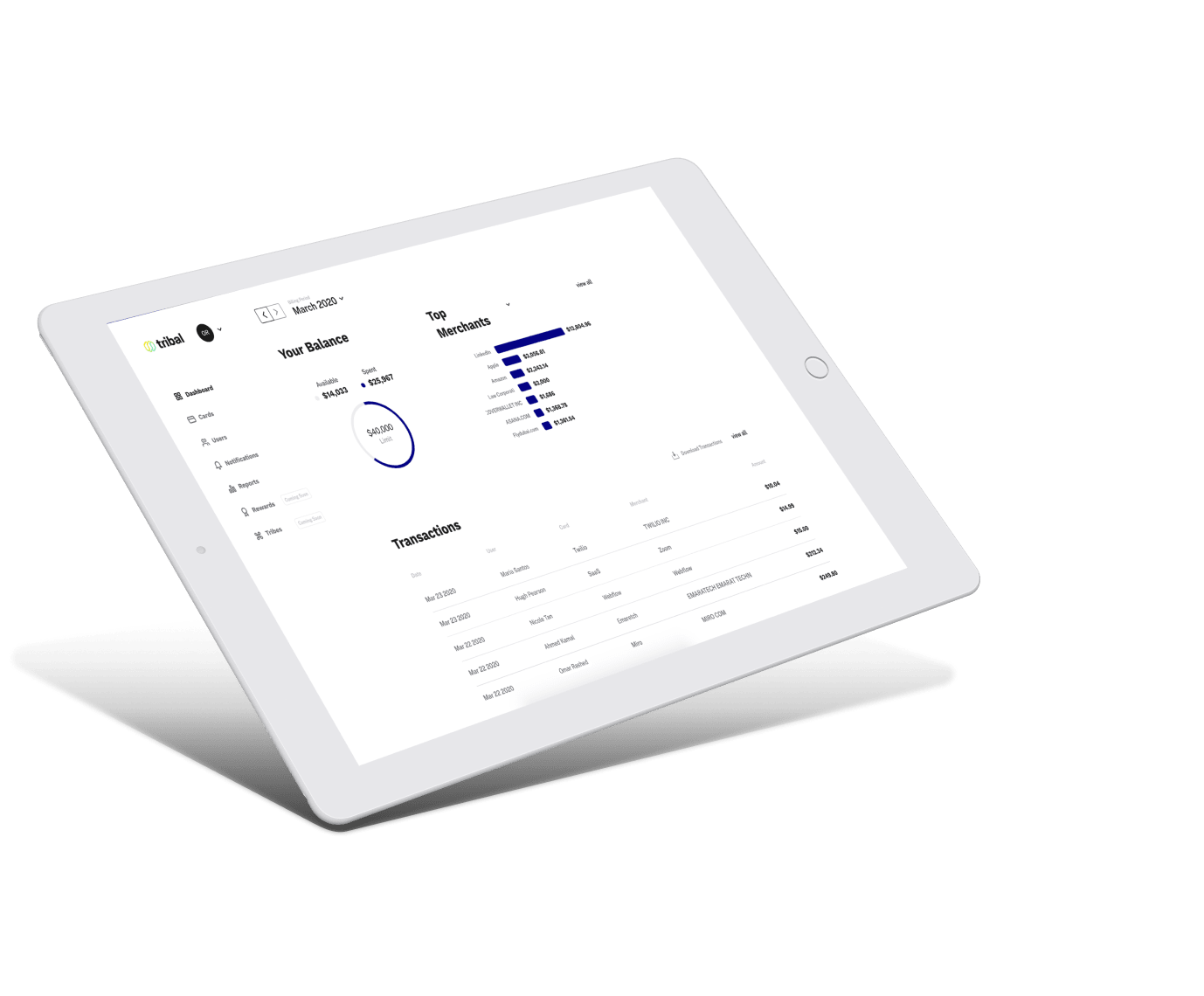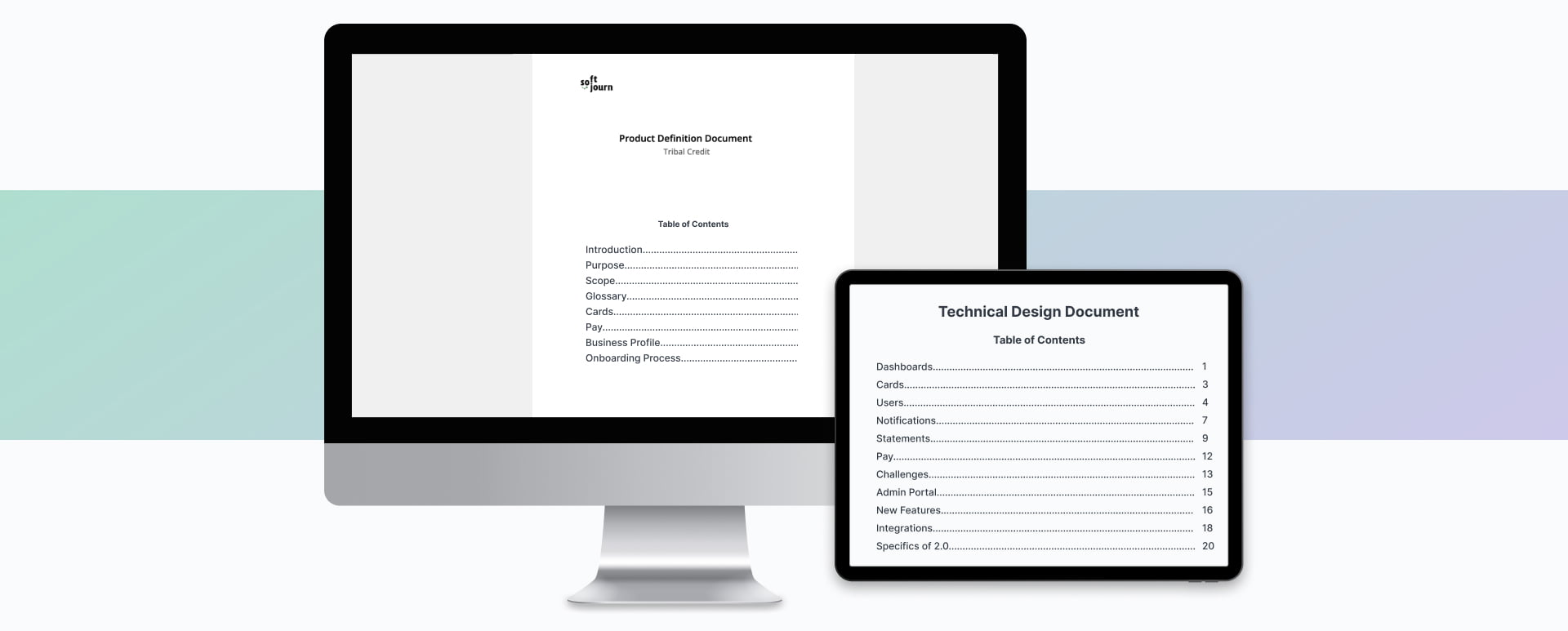Softjourn really helped us grow to the next phase, and provided the stability for the transition to 2.0. I really enjoyed working with Softjourn, and am excited to keep on working with them.
Tribal Credit: A Proactive Partnership Eliminated Blockers & Saved Time for a Fintech Company

ABOUT THE CLIENT:
SERVICES USED:
SERVICES USED:
CHALLENGE:
Tribal Credit wanted to transition their existing 1.0 system to a newly developed and updated 2.0 version. They needed to make sure that the new version of their system would contain all of the functionality of their past system.
SOLUTION:
Due to the complexity of transitioning to a new system, Softjourn assisted Tribal Credit in developing the needed documentation, as well as providing high-quality technical guidance extending their team with the technical talent needed to keep their platform version 1.0 functioning while 2.0 was rolling out and being tested.
RESULTS:
- The documentation we developed for Tribal Credit ensured that their transition from version 1.0 to 2.0 was smooth.
- Tribal Credit used our documentation for onboarding their employees on the new system.
- Expanding their team helped get Tribal Credit’s upgrade up and going faster.
- We helped optimize their database, increasing its speed and helping the client avoid potential issues.
About the Project
We recently partnered with Tribal Credit, a Fintech company that supports startups and SMEs by optimizing their financial management and helping them manage the spending of their distributed teams.
The client’s services include physical and virtual multi-currency Visa business cards, and methods to make payments when merchants don’t accept credit cards. To use these services, each business is evaluated and must be approved for credit lines by the client’s AI-driven underwriting approval process.
We had worked with one of the leaders of Tribal Credit during a successful past project, and because he trusts in our fintech industry knowledge, he proposed to his team that Softjourn would be an asset to their current project.
To best help the client, we quickly jumped in and began researching the multiple projects the client was working on, since they had several applications, such as cross-border payments, application onboarding, as well as other internal and external products.
Once our team was up to speed, we collaborated with Tribal Credit to create clear product documentation, optimize their database, and enhance their teams with our technical talent, while providing specialized guidance during our work together.

The Need
Tribal Credit wanted to transition their existing 1.0 system to a newly developed and updated 2.0 version. Specifically, they needed to make sure that the new version of their system would contain all of the functionality of their past system.
Softjourn suggested that we document all that went into Tribal Credit’s 1.0 version, such as the current applications and integrations with card issuers and third parties. This way, they would be confident that 2.0 would function similarly to their previous version and be stable and scalable.
Developing this documentation would entail organizing communication with product owners, application managers, and other stakeholders who were involved in aspects of the 1.0 system.
Since our client wanted to release 2.0 in a specific time frame, they requested our support in maintaining version 1.0 so their team would have more flexibility to work on finishing the new release.
Due to the complexity of transitioning to a new system, Tribal Credit asked us for assistance in developing the needed documentation, providing high-quality technical guidance, and our assistance in extending their team with the technical talent needed to keep version 1.0 version while 2.0 was rolling out and being tested. Overall, we provided .NET and Java developers as well as a head of Quality Assurance and QA team – both automated and manual.

The Solution
We reached out to the needed stakeholders and analyzed Tribal Credit’s current system to create the following documentation:
- Product Discovery Document (PDD) - This described the full system, all processes, and the applications translated into business language.
- A detailed Technical Design Documentation (TDD) - This included our Solution Architect’s insights on multiple technical improvements the client could make when they develop their new system.
- A Requirements Traceability Matrix - This helps the client determine the most and least flexible requirements of their product based on time, cost, and quality, as well as mapping out the dependency between requirements and the source of the requirements.
- Project Process Tracking which measured progress on the project and the potential risks the project could face.
During our collaboration, we provided the client with senior Java developers to help them with aspects of their 2.0 system, .NET developers to improve the 1.0 source code, a solutions architect with deep fintech knowledge to provide industry-specific advisory services, and a quality assurance team that helped them build automated QA and develop processes for manual testing.

The documentation we developed for Tribal Credit ensured that their transition from version 1.0 to 2.0 was smooth.
When creating the documentation, we took into account our client’s circumstances, their product, their blockers, and how we can guide them toward a great solution.
When there is a blocker, we do everything we can to solve the issue and ‘unblock’ it using creative approaches. Our proactive approach allows the client to receive productive work, even in the face of difficult blockers.
Tribal Credit’s Head of Engineering often agreed with our technical guidance, including implementing some clever workarounds we suggested when there was a lack of access to a third-party’s API.
Since our client had specific time constraints, Project Process Tracking was essential for carefully measuring the progress of the project. This way, the client could communicate deadlines with their stakeholders and third parties.
We know some technical aspects of the project can be complicated, so we make sure to clearly communicate with our clients and their stakeholder, so they fully understand what is needed for transitioning to the new system. In our documentation, we translated complicated technical terms into more digestible language for business use.
Tribal Credit decided to use parts of the technical documentation for onboarding their employees because the information we provided is easily understandable and highly useful for quickly getting workers up to speed about the many parts of their system. They also use the Product Definition Document for onboarding cardholders, admins, and the client’s whole team.
Expanding their team helped get Tribal Credit’s upgrade up and going faster, improved their QA processes, gave them access to industry-specific technical advisory services, and provided the client with more time to focus on other items.
For example, since Softjourn’s .NET developers helped solve some issues in the client’s 1.0 system, there were fewer issues for them to deal with, and thus less downtime was needed to fix errors.
We also provided specific recommendations to optimize their database which increased its speed and helped the client avoid potential future database issues.

Conclusion
Softjourn finished all of our planned work on time, and some of our teams are still working on Tribal Credit’s system.
We were told by several members of the client’s team that they felt confident with our team’s ability to consistently fix tough technical issues. They also appreciated how quickly and eagerly Softjourn’s team picked up the complex project requirements.
Justin Maples, the Head of Engineering at Tribal Credit said, “Softjourn really helped us grow to the next phase, and provided the stability for the transition to 2.0. I really enjoyed working with Softjourn, and am excited to keep on working with them.”
When we form a partnership with our clients, we always focus on doing “one more thing” of value. We don’t just sit and wait - instead, we look to drive the process, make proposals, find solutions, and deliver the best results. Our clients appreciate this approach because we always seek innovative workarounds for their issues.
One of Softjourn’s PMs working on this project said, “Even though we worked as an extension of the client’s team, we focused deeply on improving their product and treated it as if it was our own application.”
Overall, the client was happy to be able to direct more of their attention to developing their 2.0 system, while Softjourn’s helped to maintain their 1.0 system.
Looking for a software development company that will treat you not just as a client, but as a partner? Look no further. At Softjourn, we dedicate ourselves to creating well-researched and innovative tech solutions for your project. Please do not hesitate to reach out for a free consultation with our experienced advisors.
Partnership & Recognition






